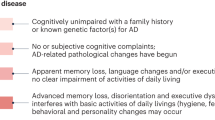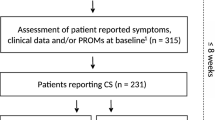Abstract
Purpose of Review
Dementia detection in the community is challenging. The purpose of this paper is to review methods of dementia screening and provide a useable algorithm for screening for dementia a variety of clinical settings.
Recent Findings
In recent years, a number of brief performance and informant-based assessments have been developed and validated in research, clinical, and community samples. These assessments are now complemented by patient self-reports that afford the ability to detect subjective cognitive impairment.
Summary
An optimal approach to dementia screening is to combine performance, informant, and self-reports, many of which can be completed in the waiting room or by non-physician staff prior to the start of the office visit. This diverse information may help inform the provider as to the presence or absence of a cognitive disorder, assist in staging the extent of the disorder, and help to develop a differential diagnosis and management plan.

Similar content being viewed by others
References
Papers of particular interest, published recently, have been highlighted as: • Of Importance
• Alzheimer’s Association. 2016 Alzheimer’s disease facts and figures. Alzheimers Dement. 2016;12:459–509. An annually updated paper covering all aspects of Alzheimer’s disease.
• Haaksma ML, Vilela LR, Marengoni A, Calderón-Larrañaga A, Leoutsakos JS, Olde Rikkert MGM, et al. Comorbidity and progression of late onset Alzheimer’s disease: a systematic review. PLoS One. 2017;12:e0177044. A well-done paper discussing the role that multiple comorbidities may plan in onset and progression of Alzheimer’s disease.
Tolea MI, Galvin JE. Current guidelines for dementia screening: shortcomings and recommended changes. Neurodegener Dis Manag. 2013;3(6):565–73. https://doi.org/10.2217/nmt.13.58.
Galvin JE. Dementia screening, biomarkers and protein misfolding: implications for public health and diagnosis. Prion. 2011;5(1):16–21. https://doi.org/10.4161/pri.5.1.14439.
Galvin JE. Optimizing diagnosis and management in mild-to-moderate Alzheimer’s disease. Neurodegener Dis Manag. 2012;2(3):291–304. https://doi.org/10.2217/nmt.12.21.
Galvin JE, Sadowsky CH. Practical guidelines for the recognition and diagnosis of dementia. J Am Board Fam Med. 2012;25(3):367–82. https://doi.org/10.3122/jabfm.2012.03.100181.
Biagioni MC, Galvin JE. Using biomarkers to improve detection of Alzheimer’s disease. Neurodegener Dis Manag. 2011;1(2):127–39. https://doi.org/10.2217/nmt.11.11.
Galvin JE, Fagan AM, Holtzman DM, Mintun MA, Morris JC. Relationship of dementia screening tests with biomarkers of Alzheimer’s disease. Brain. 2010;133(11):3290–300. https://doi.org/10.1093/brain/awq204.
Folstein MF, Folstein SE, McHugh PR. Mini-mental state: a practical methods for grading the cognitive state of patients for the clinician. J Psychiatr Res. 1975;12(3):189–98. https://doi.org/10.1016/0022-3956(75)90026-6.
Borson S, Scanlan JM, Watanabe J, SP T, Lessig M. Simplifying detection of cognitive impairment: comparison of the mini-cog and mini-mental state examination in a multiethnic sample. J Am Geriatr Soc. 2005;53(5):871–4. https://doi.org/10.1111/j.1532-5415.2005.53269.x.
Nasreddine ZS, Phillips NA, Bedirian V, Charbonneau S, Whitehead V, Collin I, et al. The Montreal cognitive assessment, MoCA: a brief screening tool for mild cognitive impairment. J Am Geriatr Soc. 2005;53(4):695–9. https://doi.org/10.1111/j.1532-5415.2005.53221.x.
Karantzoulis S, Galvin JE. Distinguishing Alzheimer’s disease from other major forms of dementia. Expert Rev Neurother. 2011;11(11):1579–91. https://doi.org/10.1586/ern.11.155.
Karzmark P. Validity of serial seven procedure. Int J Geriatr Psychiatry. 2000;15(8):677–9. https://doi.org/10.1002/1099-1166(200008)15:8<677::AID-GPS177>3.0.CO;2-4.
Brandt J, Manning KJ. Patterns of world list generation in mild cognitive impairment and Alzheimer’s disease. Clin Neuropsychol. 2009;23(5):870–9. https://doi.org/10.1080/13854040802585063.
Tariq SH, Tumosa N, Chibnall JT, Perry MH III, Morley JE. Comparison of the Saint Louis University mental status examination and the mini-mental state examination for detecting dementia and mild neurocognitive disorder—a pilot study. Am J Geriatr Psychiatry. 2006;14:900–10.
• NIH Toolbox. http://www.healthmeasures.net/explore-measurement-systems/nih-toolbox (Accessed Dec 12, 2017). Information and permission inquiries for the NIH Toolbox.
Galvin JE, Roe CM, Xiong C, Morris JC. The validity and reliability of the AD8 informant interview for dementia. Neurology. 2006;67(11):1942–8. https://doi.org/10.1212/01.wnl.0000247042.15547.eb.
Jorm AF. The informant questionnaire on cognitive decline in the elderly (IQCODE): a review. Int Psychogeriatr. 2004;16(3):275–93. https://doi.org/10.1017/S1041610204000390.
Razavi M, Tolea MI, Margrett J, Martin P, Oakland A, Tscholl DW, et al. Comparison of 2 informant questionnaire screening tools for dementia and mild cognitive impairment: AD8 and IQCODE. Alzheimer Dis Assoc Disord. 2014;28(2):156–61. https://doi.org/10.1097/WAD.0000000000000008.
• Galvin JE. The quick dementia rating system (QDRS): a rapid dementia staging tool. Alzheimers Dement (Amst). 2015;1:249–59. A new instrument that permits the rapid staging of cognitive impairment with high correlation to gold standard measurements such as the Clinical Dementia Rating and neuropsychological testing.
• Berman SE, Koscik RL, Clark LR, Mueller KD, Bluder L, Galvin JE, et al. Use of the quick dementia rating system (QDRS) as an initial screening measure in a longitudinal cohort at risk for Alzheimer’s disease. JAD Rep. 2017;1:9–13. A demonstration of the QDRS in a community-based longitudinal Alzheimer Prevention study.
Kelleher M, Tolea MI, Galvin JE. Anosognosia increases caregiver burden in mild cognitive impairment. Int J Geriatr Psychiatry. 2016;31(7):799–808. https://doi.org/10.1002/gps.4394.
• Li C, Neugroschl J, Luo X, Zhu C, Aisen P, Ferris S, et al. The utility of the cognitive function instrument (CFI) to detect cognitive decline in non-demented older adults. J Alzheimers Dis. 2017;60:427–37. The CFI is a useful tool to quantify subjective memory complaints and predict whether patient is likely to go to develop cognitive impairment and dementia.
• Rattanabannakit C, Risacher SL, Gao S, Lane KA, Brown SA, McDonald BC, et al. The Cognitive Change Index as a measure of self and informant perception of cognitive decline: relation to neuropsychological tests. J Alzheimers Dis. 2016;51:1145–55. Another recently developed instrument, the CCI helps to quantify subjective memory complaints and predict whether patient is likely to go to develop cognitive impairment and dementia.
Yesavage JA, Brink TL, Rose TL, Lum O, Huang V, Adey M, et al. Development and validation of a geriatric depression screening scale: a preliminary report. J Psychiatr Res. 1983;17:37–49.
Galvin JE, Roe CM, Coats MA, Morris JC. Patient’s rating of cognitive ability: using the AD8, a brief informant interview, as a self-rating tool to detect dementia. Arch Neurol. 2007;64(5):725–30. https://doi.org/10.1001/archneur.64.5.725.
• Vogel JW, Varga Doležalová M, La Joie R, Marks SM, Schwimmer HD, Landau SM, et al. Subjective cognitive decline and β-amyloid burden predict cognitive change in healthy elderly. Neurology. 2017;89:2002–9. A recent study examining the relationship between subjective cognitive decline and amyloid burden, but is limited by the capture of data extracted from the Geriatric Depression Scale.
Scharre DW, Chang SI, Murden RA, Lamb J, Beversdorf DQ, Kataki M, et al. Self-administered gerocognitive examination (SAGE): a brief cognitive assessment instrument for mild cognitive impairment (MCI) and early dementia. Alzheimer Dis Assoc Disord. 2010;24(1):64–71. https://doi.org/10.1097/WAD.0b013e3181b03277.
Park SC, Lee HY, Lee DW, Hahn SW, Park SH, Kim YJ, et al. Screening for depressive disorder in elderly patients with chronic physical diseases using the Patient Health Questionnaire-9. Psychiatry Investig. 2017;14(3):306–13. https://doi.org/10.4306/pi.2017.14.3.306.
Olssøn I, Mykletun A, Dahl AA. The Hospital Anxiety and Depression Rating Scale: a cross sectional study of psychometrics and case-finding abilities in general practice. BMC Psychiatry. 2005;5(1):46. https://doi.org/10.1186/1471-244X-5-46.
Author information
Authors and Affiliations
Corresponding author
Ethics declarations
Conflict of Interest
James Galvin is the primary copyright holder of the AD8 (with Washington University) and the QDRS (with New York University). His research is supported by grants from NIH (R01 AG040211, U01 NS100610, R01 AG054425, and R01 AG056610), the Florida Department of Health, and the Harry T. Mangurian Foundation. He serves as a consultant for Biogen, Axovant, Eli Lilly, and Eisai. He directs clinical trials for Novartis, Amgen, Genentech, Biogen, Janssen, and Axovant. None of the sponsors are involved in the development or publication of this manuscript.
Human and Animal Rights and Informed Consent
This article does not contain any studies with human or animal subjects performed by any of the authors.
Additional information
This article is part of the Topical Collection on Neurology of Aging
Rights and permissions
About this article
Cite this article
Galvin, J.E. Using Informant and Performance Screening Methods to Detect Mild Cognitive Impairment and Dementia. Curr Geri Rep 7, 19–25 (2018). https://doi.org/10.1007/s13670-018-0236-2
Published:
Issue Date:
DOI: https://doi.org/10.1007/s13670-018-0236-2




